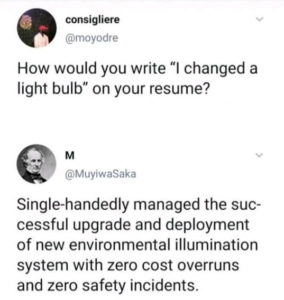In my early twenties, I had a friend who had little respect for the established order of things. Jason was a born-disruptor, happiest and most comfortable when things were uncertain and chaotic. I’ve always been drawn to people like that, perhaps because I’m not, by nature, one of them.
We were young and fresh off the boat in a foreign city, hustling to find work and carving out new lives for ourselves. Before settling down I did loads of different jobs to find my feet – I wasn’t paid much but I earned life lessons that have stayed with me ever since. One of them was that we are adaptable beings; we can flex and flow and reinvent ourselves in response to our purpose and circumstances.
Jason, however, took it to the extreme. I remember bumping into him once and he announced that he was working as a trader. I was shocked – I knew he had no background in finance. When I asked how he had got the job, he casually said he had lied on his CV.
“And the interview?”
“I bluffed.”
On his first day, his manager asked him to do some manual work that included the reporting of company dividends. “No problem,” he said, and then as the manager walked away, he turned to his fellow new recruit and whispered, “What’s a dividend?” His colleague laughed. “No, really, what’s a dividend?” my friend repeated. He was met with a mixture of disbelief and disgust. Jason eventually charmed that person–another skill of his–into keeping his secret and teaching him the basics.
My friend was a big believer in “fake it till you make it,” and it served him well. He was a hard worker and fast learner and he went on to a very successful career in corporate finance. It is because of stories like this that FITYMI is recommended as a way to get out of a rut or into a new career.
There’s plenty that I like about this approach. It has a pioneering spirit, the willingness to take risks in order to reach a future goal. At its best, it falls the right side of the thin line between creativity and outright deceit. It fosters ambiguity, and working with ambiguity is one of the most important skills to learn in the 21st century.
But there are limits. Here are three suggestions for making sure that faking doesn’t lead to breaking your career:
1. Don’t lie on your CV

Yes, putting together a CV that will get you an interview often requires reinterpreting your experience to suit the requirements and expectations of the job post. Sometimes this means creative rewriting (see below) and sometimes it means emphasizing certain areas of your work history.
But, never invent. It worked for my friend, but any good career coach will advise you against lying on your CV. There are a number of reasons for this.
Firstly, it’s dishonest. Though it’s not the kind of dishonesty that directly hurts people (though in some situations it could result in that), if you get the job that lie will be the foundation for your relationship with your hiring manager and employer. They won’t know it, but it will be there. Such scenarios seldom end well.
Secondly, if successful in your job application, you will very possibly end up out of your depth. Starting a new job is tough enough, with plenty to learn and familiarize yourself with. If you believe that you will also have time to acquire a new skill that you pretended you had, you’re probably setting yourself up for failure.
Thirdly, you will very likely be caught. And employers do not respond well to that type of deception. It is in almost all cases a dismissible offense without any prospect of notice, references or severance pay. The impact on your career path could be devastating. Depending on your industry or line of work, misrepresentation in your job application could even be illegal.
2. Be careful about what you fake
Amy Cuddy suggests we fake it till we make it in order to develop greater self-confidence and a sense of personal power. Many self-help gurus advocate a similar approach, a mix of empowering body language and positive mental reinforcement. Naturally, there is nothing wrong with this. If you appear confident and self-assured in a job interview despite secretly feeling terrified and insecure, you are practicing valuable skills of self-management.
However, if you fake core technical skills or industry knowledge you are heading for a poor outcome. The same applies if you knowingly inflate your abilities. Of course, we all tend to exaggerate our capacities sometimes. This is not just because we want others to think better of us; most of the time we genuinely believe this about ourselves and overestimate, especially when we are imagining ourselves in a future role.
A lot of attention has been paid recently to imposter syndrome – a psychological pattern in which an individual doubts their accomplishments and has a persistent internalized fear of being exposed as a “fraud”. Having worked with such individuals in coaching relationships I know how limiting and difficult it can be to be constantly plagued by this type of nagging self-doubt.
The tricky thing is, imposter syndrome is mostly in your head, but that doesn’t mean it is all in your head. Sometimes we are genuinely ill-equipped to handle what is asked of us, but we continue pretending to those around us that we are fine.
Being able to discern the subtle difference between the two requires will and self-knowledge.
3. Know yourself
Jason was a maverick, one of those people that enjoyed risk and the game of pretense, despite the potential fallout. Very few people are coded this way. Before you begin faking anything, know your limits. Know yourself.
Some personality types, for example, are more prone to feeling like an imposter than others. Some people are comfortable with ethical ambiguity, others appreciate clear lines of right and wrong. Some people can handle the balance of authenticity and inauthenticity that is a realistic part of our careers and social lives; others struggle.
Recognizing how you respond to these challenges allows you to make better decisions regarding how you present yourself to the world, and even who that ‘self’ is.
Photo by Nicholas Kusuma on Unsplash
